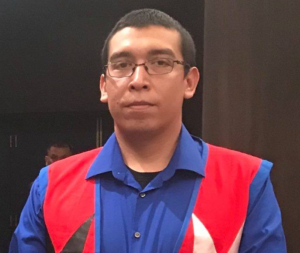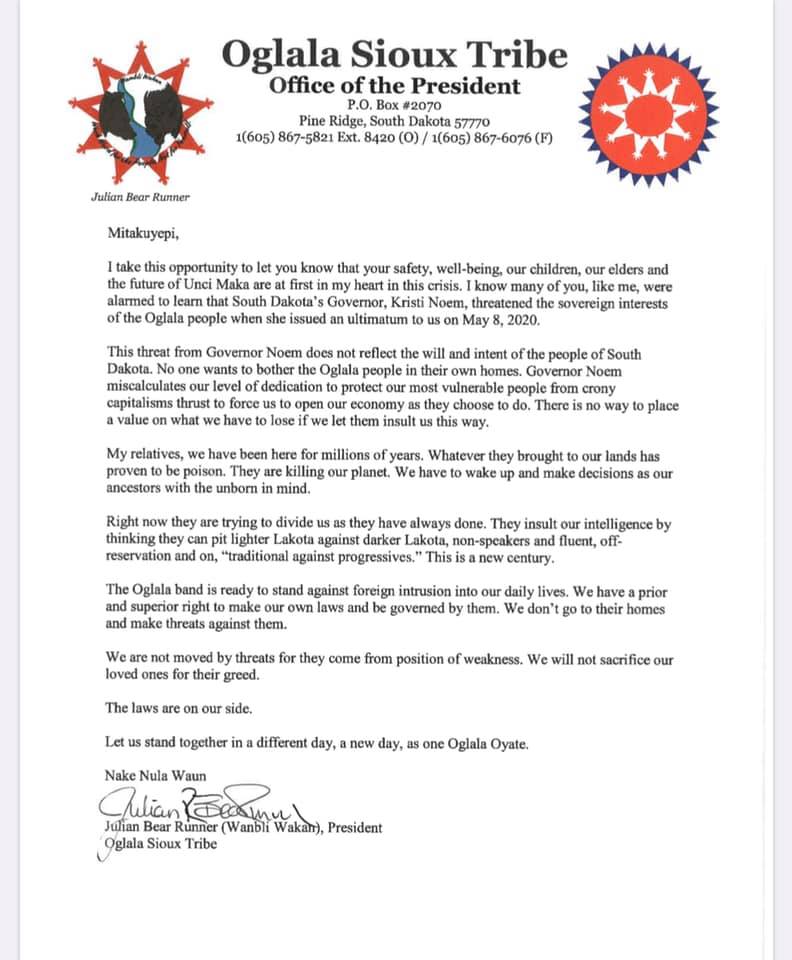- Details
- By Levi Rickert
PINE RIDGE INDIAN RESERVATION — Oglala Sioux Tribe President Julian Runner Bear reacted to South Dakota Governor Kristi Noem’s Friday letter in which she threatened legal action against the Oglala Sioux Tribe if 10 checkpoints into the Pine Ridge Indian Reservation were not removed within 48 hours.
 Oglala Sioux Tribe President Julian Running Bear
Oglala Sioux Tribe President Julian Running Bear
The checkpoints remain intact as of today.
The checkpoints were put in place to help curtail traffic into the reservation, which is home to some 21,000 tribal citizens.
The Oglala Sioux Tribe is one of eight South Dakota tribes that said in late April they felt Gov. Noem had not taken strong enough action to combat the COVID-19 pandemic in the state. She never issued a stay-at-home order in the state. During the third week of April, Smithfield Foods meat packing plant in Sioux Falls, South Dakota had 700 of its 3,700 employees test positive for the coronavirus.
After receipt of Friday’s letter from the Gov. Noem, the Oglala Sioux Tribe said they would not abide by the request to remove the checkpoints.
“Governor Noem miscalculates our level of dedication to protect our most vulnerable people from crony capitalism’s thrust to force us to open our economy as they choose to do,” Runner Bear wrote.
For Runner Bear, Noem’s request with a threat of legal action if the checkpoints are not removed, comes down to the sovereignty of tribes.
“The Oglala band is ready to stand against foreign intrusion into our daily lives. We have a prior and superior right to make our own laws and be governed by them. We don’t go into their homes and make threats against them.”
According to the South Dakota Department of Health coronavirus website, as of Sunday, May 10, there have been 3,393 confirmed positive coronavirus cases in the state and 34 confirmed deaths. In Oglala County, where the Pine Ridge Indian Reservations sits, there has been one confirmed coronavirus case and zero deaths.

More Stories Like This
Native News Weekly (August 25, 2024): D.C. BriefsDeb Haaland Rolls Out Affordability Agenda in Albuquerque
Boys & Girls Clubs and BIE MOU Signing at National Days of Advocacy
National Congress of American Indians Mourns the Passing of Former Executive Director JoAnn K. Chase
Navajo Nation Mourns the Passing of Former Vice President Rex Lee Jim
Help us defend tribal sovereignty.
At Native News Online, our mission is rooted in telling the stories that strengthen sovereignty and uplift Indigenous voices — not just at year’s end, but every single day.
Because of your generosity last year, we were able to keep our reporters on the ground in tribal communities, at national gatherings and in the halls of Congress — covering the issues that matter most to Indian Country: sovereignty, culture, education, health and economic opportunity.
That support sustained us through a tough year in 2025. Now, as we look to the year ahead, we need your help right now to ensure warrior journalism remains strong — reporting that defends tribal sovereignty, amplifies Native truth, and holds power accountable.
 The stakes couldn't be higher. Your support keeps Native voices heard, Native stories told and Native sovereignty defended.
The stakes couldn't be higher. Your support keeps Native voices heard, Native stories told and Native sovereignty defended.
Stand with Warrior Journalism today.
Levi Rickert (Potawatomi), Editor & Publisher

